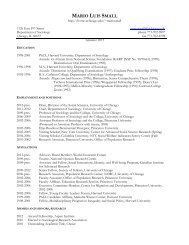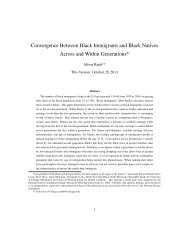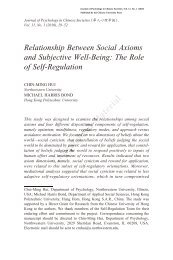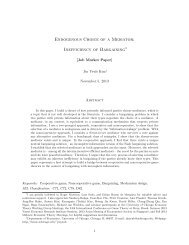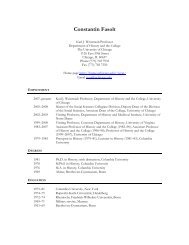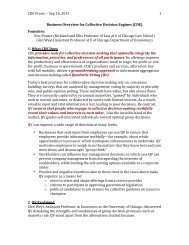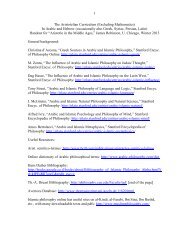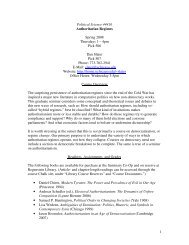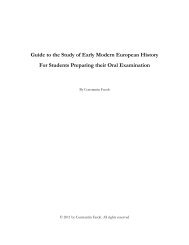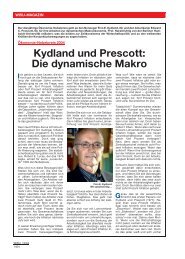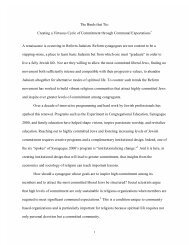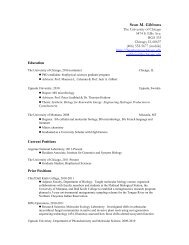Leopold Sedar Senghor Liberte 1:Negritude et Humanisme. On ...
Leopold Sedar Senghor Liberte 1:Negritude et Humanisme. On ...
Leopold Sedar Senghor Liberte 1:Negritude et Humanisme. On ...
You also want an ePaper? Increase the reach of your titles
YUMPU automatically turns print PDFs into web optimized ePapers that Google loves.
Book Reviews<br />
This book is a valuable addition to the debate about young women and<br />
the future of feminism. Reger’s major and unique contribution is to bring<br />
tog<strong>et</strong>her a political generations perspective, a deep knowledge of social<br />
movement studies, and attention to local community dynamics. While at<br />
times it comes across as slightly labored as every topic is worked through<br />
case study by case study, the argument about the state of contemporary<br />
feminism becomes strong, clear, and compelling chiefly because of this focus<br />
on specific activist communities. A substantive rather than style-related<br />
limitation is the choice of communities, especially given that they are in many<br />
ways so similar. It would have been extremely interesting to include feminist<br />
activist communities that were not overwhelmingly white and middle<br />
class. However, Reger makes no claims to representativeness nor generalizability<br />
and indeed she is able to unpack many challenges related to privilege<br />
as a result of her case-study choices.<br />
Reger’s argument that overlap and dialogue characterize the relationship<br />
b<strong>et</strong>ween contemporary and second wave feminisms is also an important<br />
angle in this book. While she rightly rejects categorization of feminists<br />
according to age range and uses the term “contemporary feminists” instead<br />
of “young feminists” in order to g<strong>et</strong> at overlapping generations, this nuance<br />
was not reflected in the constituencies of the activist communities ðpartly<br />
no doubt a result of having two college-based case studiesÞ. We come away<br />
with some important questions about how different political generations<br />
can and do interact and work tog<strong>et</strong>her. The book is insightful, important,<br />
and tremendously helpful for anyone seeking a rigorous, empirically<br />
grounded assessment of the state of contemporary and future feminist activism<br />
in the United States.<br />
Liberté 1: <strong>Negritude</strong> <strong>et</strong> <strong>Humanisme</strong>. By Léopold Sédar <strong>Senghor</strong>. Paris: Éditions<br />
du Seuil, 1964. Pp. 445.<br />
<strong>On</strong> African Socialism. By Léopold Sédar <strong>Senghor</strong>. Translated by Mercer<br />
Cook. New York: Praeger, 1964. Pp. 173.<br />
Barbara Celarent *<br />
University of Atlantis<br />
Although he became an internationally famous political leader, throughout<br />
his life Léopold Sédar <strong>Senghor</strong> remained an intellectual. His po<strong>et</strong>ry is<br />
enshrined as classic. His incidental writings make up five thick volumes of<br />
elegant prose. His concept of “negritude” remains a vibrant challenge to the<br />
many vari<strong>et</strong>ies of racism. If politics did not leave <strong>Senghor</strong> the time to transform<br />
all of this insight into a systematic analysis of soci<strong>et</strong>y, it non<strong>et</strong>heless<br />
provided him with a breadth of experience and a depth of understanding<br />
* Another review from 2052 to share with AJS readers.—Ed.<br />
299<br />
This content downloaded from 128.135.12.127 on Wed, 13 Nov 2013 17:25:32 PM<br />
All use subject to JSTOR Terms and Conditions



